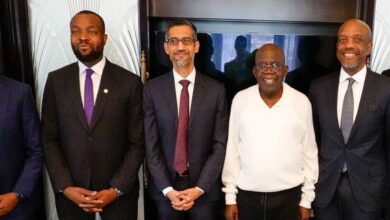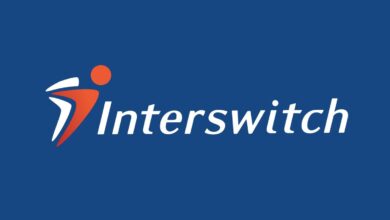How Cowry Card is Solving Lagos Transportation Problems Through Smart Solutions
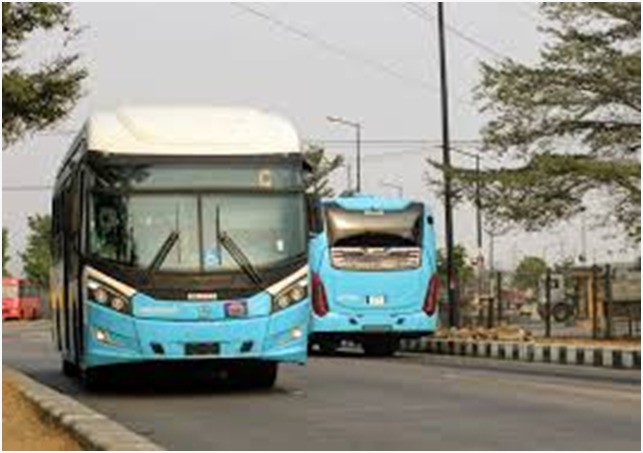
By Joseph Olaoluwa
Nena Okon dreads going to work. As a content creator, the 26-year-old should be able to work from anywhere, but her equipment and office are located in the busy Lagos Island. To save commuting costs and keep her spending to under N1,200 a day, Okon, who lives an hour away on the Mainland, uses the infamous black-and-yellow buses, popularly called “danfo.”
But danfos, most of which are rickety buses from the 1980s, are terrible and barely clinging to life, she said. These buses have no real seats — owners typically replace foam seats with plain wood to save costs — and when it rains commuters in these leaky vehicles get slapped with annoying droplets of water. “A lot of my time was wasted and it was basically overcrowded,” she adds.
But in September, Okon discovered that a new line of government-owned buses, the Bus Rapid Transit (BRT), were now available on her route. The BRTs, first introduced in the late 2000s, have quickly become ubiquitous on Lagos highways with clear routes and designated paths on the road. In 2018, the state government rejigged the BRT, introducing a new line of blue Mercedes buses, to displace their black and yellow counterparts.
The hallmark of the redesign, however, was not the new buses or terminals; it was something nimble: the Cowry contactless payments technology. It allows commuters to travel across town and pay for bus rides using their touch-and-go Cowry cards, a payments card based on near-field communication (NFC) technology. Taking a cue from major cities like New York, newer BRT buses come fitted with NFC technology which has simplified commuting in Lagos.
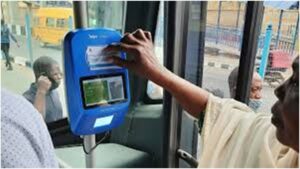
The technology has two advantages, said Okon, who is now a regular user. First, it creates a seamless bus checking-in experience, removing the rowdiness and commotion that has been a daily fixture with the danfos while ensuring buses are less crowded, she explained. Second, with preloaded Cowry cards, bus prices are stable, unlike the black and yellow lines where fares increase dramatically during rush hour or when it rains. Additionally, the switch to digital payments helps reduce corruption by low-level city transport workers who hike prices or fail to remit bus fares to the state’s treasury.
The Cowry card technology is the brainchild of Touch and Pay Technologies, or TAP, a startup founded in 2017 by Olamide Afolabi, Michael Oluwole and Kabir Yabo to support payments for mobility services in one of Africa’s biggest states by GDP.
“People don’t like the fact that they have to worry over bus fare, battle bus conductors and go through rough days. They just tap, the amount is deducted and they move on,” Afolabi, TAP’s CEO said.
The company said it now has 3.8 million users in Lagos who complete 500,000 trip payments daily. TAP remits fares to city authorities but takes a fee, between 5% and 10% for its services. “The commission we receive varies for different states, Afolabi shared. “In some cases, it’s less than 10% and others less than 5% depending on the volume, value and buying power [of state customers],” he added, noting that customers in some states don’t want to spend up to ₦200 for a 30-kilometre ride.
While TAP touts its digital infrastructure, it uses physical agents at bus terminals to sell cards to first-time users, and a majority of card balance top-up transactions are completed in person with these bus agents.
TAP has raised around $4 million in venture funding largely from New York firm, Unicorn Growth Capital and undisclosed funding from True Capital Management, a San Francisco-based multi-family office, according to Crunchbase data. And in January 2021, the startup joined the Y Combinator accelerator programme, the venture growth institution which has spun several successful companies, including Stripe, Flutterwave, and Paystack.

TAP is looking to scale to over 10 million customers and is currently planning to raise as much as $4 million in a new Series A round of funding which could close by “hopefully by next year,” Afolabi explained.
But TAP is not the first startup that has attempted to disrupt mobility payments in Lagos. Gona, a China-based startup attempted to digitize fare payments for danfo buses. And in the past, some startups had huge success providing digital platforms for bike hailing. But these efforts never took off or, in the case of bike hailing, were killed by city regulators.
However, TAP has had a successful run, in no small part due to its proximity to the Lagos State government. Cowry Card was launched in 2020 when state Governor Babajide Sanwoolu commissioned the Abule Egba-Oshodi BRT route. This was the turning point for TAP, its CEO told TechCabal, which has remained in partnership with the state government ever since. While Afolabi claims the company is private and has no investment from the state, he said TAP’s contactless fare collection was what made the Lagos State Government take a bet on them.
The fintech is now the sole service responsible for accepting payments on Lagos’ intracity transport system including the BRTs and Lagos Ferries, the water transport. TAP is also the payments technology provider for the recently launched Lagos Blue Line train service which started operations in September and is expected to move 150,000 passengers daily.
In October, the state government shared that the BRTs transported 7.4 million passengers between the start of August and the end of September, and it transported an additional 17,543 commuters through the ferries, collecting ride fares of nearly N2 billion during this period.
“One thing is clear: our electronic payment platform [Cowry] is assisting us to gather useful data which will allow us to plan transport services to the teeming people of Lagos State,” said Abimbola Akinajo, Managing Director of the Lagos Metropolitan Area Transport Authority (LAMATA), which runs the city’s mobility services.
TAP is currently on the expansion path, and is quietly making inroads into Ghana in West Africa.”Ghana is an essential market and a public transport market,” Afolabi says Ghana shares a lot of structural similarities with Nigeria and customer behaviour is also similar. TAP is hoping to leverage mobile money integration to grow in Ghana. “In Africa, we have a lot of mobile money penetration if you go to Kenya and other countries, [and] If we can succeed in Ghana with mobile money penetration, we will be able to repeat the same model in other countries with mobile money penetration,” he added. And within Nigeria, the fintech is looking beyond Lagos, with expansion into four states- Oyo, Ogun, Edo and Kano.
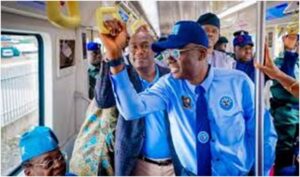
Interest in public commuting options is expected to grow over the next few months after the federal government removed fuel subsidies in May, causing the price of fuel and transportation fares to soar dramatically. Higher fares have put pressure on household income as inflation continues to rise in double digits. The Lagos government has cut prices for public buses by 50% until November to help residents adjust to the harsh economic situation. By December fare discounts will be 25%.
While TAP’s website shows the company offers NFC services for health services, event management, and identity tools, Afolabi said the doesn’t have any plan to play outside the transportation space. But he hints that Cowry card’s microtransaction use case could be useful in other scenarios that don’t require huge amounts of cash.
Perhaps in the coming year, Cowry cards could power retail payments at markets, surrounding shops, roadside traders and so on.




